WJ senior Youssef Osman speaks about Islam, explores common ground
Mercy: a shared religious belief
April 8, 2017
Senior Youssef Osman, along with other guests, addressed his class on the occasion of a field trip to learn about Islam on Friday, April 7, in the Walsh Jesuit chapel. The field trip also visited a local mosque.
Youssef promptly agreed when The Pioneer requested permission to publish his speech. An abridged version of Youssef’s thoughtful speech appears below. The video of the entire speech is included with this post.
In the name of God, the Most Beneficent, the Most Merciful,
What a time it is to be alive. We seniors are living in a time of opportunity in the greatest nation in the world. For we have bright futures ahead of us, as we will soon graduate from the halls of Walsh Jesuit. This is our current reality. This is NOT, however, the reality for the vast majority of people in many places around the world.
Even in this time of prosperity and success in the Western World and in our own personal lives, a cloud of confusion still surrounds the faith of Islam and the Middle East. In the 21st century, Islam has been misunderstood more than any other religion, especially in the West.
Statistics from the 2008 World Gallup Poll, the most comprehensive study on Muslims, reveal that less than half of Americans believe that Muslims are loyal to the United States. When Americans were asked what they like about Muslims, the answers “Nothing” and “I don’t know anything” represented the views of 57% of the respondents. That Islam is more likely to encourage violence than other faiths is the belief of 46% of Americans. But what if I were to tell you that Islam is actually a religion of mercy?
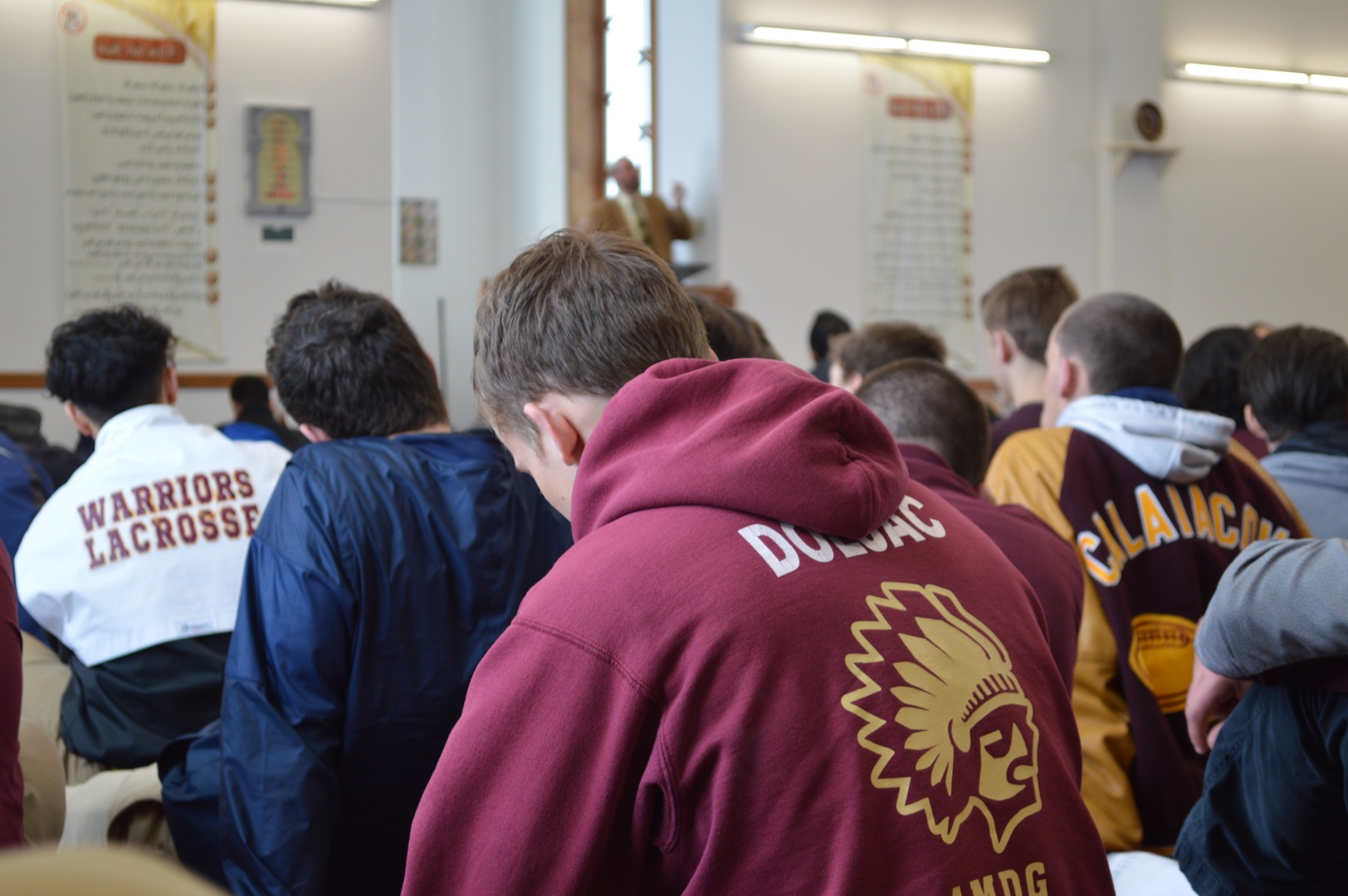
The field trip students took also offers an opportunity to visit a local mosque and attend a prayer service by members of its faith community.
Pope Francis, the leader of Catholics around the world, once stated that “Muslims and Christians are brothers and sisters. Those who claim to believe in God must also be men and women of peace.” This same concept of peace is what Islam is ultimately about. In fact, Islam comes from the root word “salam” meaning peace. In addition, one word, mercy, represents the heart of a faith that 1.8 billion people call their own. Allah, or God, is a God of Mercy, and His messenger, the Prophet Mohammed, lived out this mercy.
It is my hope that, even if you were to retain even a fraction of the information that you will read here, that you will have a new view of Muslims around the world today.
To become a Muslim, one must profess the shahada, which says in Arabic, “Ashhadu An La-Illaha Illah Allah” and in English, “There is only one God, and that Muhammad is his servant and messenger.” Muhammad, born in a society that worshiped idols, told his people to worship this one God, as did Noah, Abraham, Joseph, Solomon, David, Moses, and Jesus before him. Thus, the Islamic faith is not a new religion. Rather, Mohammed came to complete the message of Jesus. Jesus, or Isa in Arabic, was a man who lived out the Word of God by living the true meaning of mercy. Islam adheres to this very same principle.
The Prophet Muhammad grew up in the time known as Al-Jahiliya, or “The time of ignorance.” Mercy never crossed the minds of people in Arabia at that time. Islam challenged everything that had come before. No more would there be racism; true Islam promotes mercy to people of all backgrounds, races, and traditions. In his farewell speech, Muhammed said, “O people! Your God is one and your forefather (Adam) is one. An Arab is not better than a non-Arab and a non-Arab is not better than an Arab, and a white person is not better than a black person and a black person is not better than a white person, except in piety.”
Make no mistake: true Islam has nothing to do with terrorism
— Youssef Osman
Think about it: The Prophet Muhammad’s stirring words came centuries before the founding of America, where many questioned if blacks were even humans. Until a few decades ago, public places such as schools, hotels and bathrooms were still split between “White” and “Colored.” The Prophet Muhammad wanted justice for all, and he displayed that throughout his life.
Instead of the principle of “an eye for an eye, a tooth for a tooth” commonly held by many, Islam preaches mercy and nonviolence to bring about change and justice in the world. Wanting to preach a message of love and equality, the Prophet Muhammad was often punished and humiliated, so much so that he ran crying until he found refuge near a tree. Allah sent the angel Gabriel, who asked the prophet if he wanted the people punished. Muhammad said no, for the hearts of people can change. This is similar to the Catholic view that the death penalty should be abolished, for people can change their ways.
In a Hadith Qudsi, Islamic theology states that Allah said, “My mercy prevails over My wrath.” Similarly, another Hadith says that “Allah has one hundred mercies, out of which He has sent down only one for jinn, mankind, animals and insects, through which they love one another and have compassion for one another….” In Islam, Allah is not a Lord of wrath and anger. Rather, He is a merciful God, which is why he sent down the Prophet Muhammed to embody his divine principles for mankind.
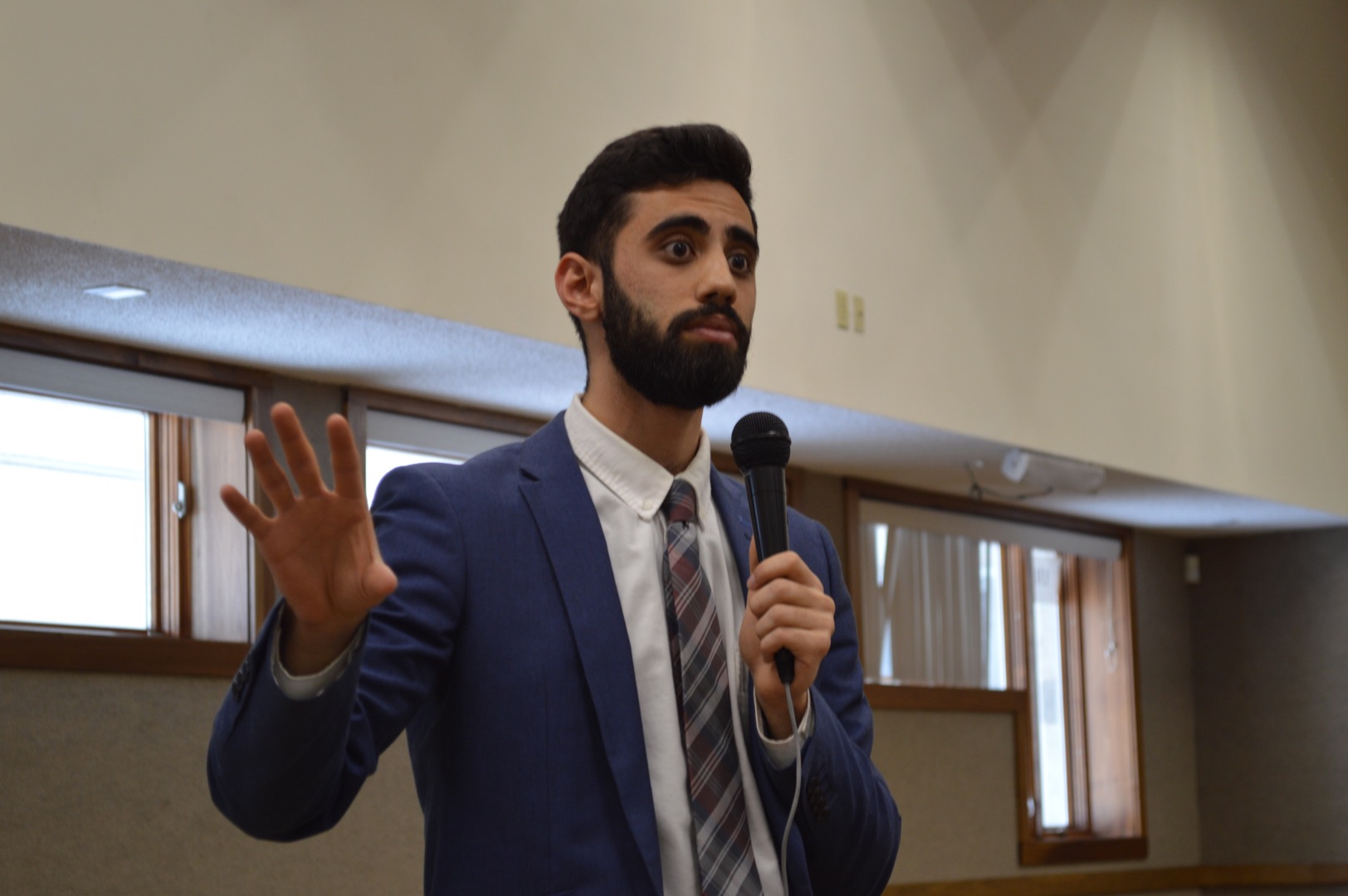
Social Director Ahmad Deeb of the Islamic Center of Akron and Kent spoke to seniors about the deep-rooted history of Islam in America and how Muslims have added to the democratic values that America has cherished for centuries.
One very misunderstood notion in Islam today is that mercy only pertains to men. In the modern world, women are still trying to gain respect equal to men, and rightfully so. In the United States, women are paid 77 cents for every one dollar a man earns for doing the same job. Frequently judged unfairly for whatever they do, women are not seen as men’s equals in many parts of the world.
In 7th century Arabia, fathers would become depressed, ashamed, and ridiculed if their wives gave birth to daughters. Girls stayed in homes and had arranged marriages. All of this changed with the Prophet’s message of mercy. The Prophet was a man of his word. Whenever his daughter, Fatimah, came to him, Muhammed would stand up in front of everyone and kiss her, then let her sit in the place where he had been sitting, just as he instructed other fathers to do.
Prior to Islam, women were not given the opportunity to be educated. The Prophet Muhammad said that “Seeking knowledge is mandatory for every Muslim, male and female.” Islam teaches women to follow their dreams and ambitions. Through Islam’s mercy for women, females were able to advance in areas such as education or even business. In fact, the Prophet’s wife, Khadijah, was the Bill Gates of her time! She had her own business and met and dealt with others from nations all around the world. Islam also granted women the right to choose their husbands, to own property, and to decide whether their husbands would have a share of that property or not. Women were now beginning to go from “zeroes” to “heroes.”
Society was being completely transformed because of one single concept: mercy. But if Islam is all about mercy, how did we get where we are in the world today?
Muslims were once the beacons of light for others in all corners of the earth. Within twenty years of the Prophet Muhammed’s death, land from as far east as China to as far west as Spain was ruled by Muslims. To many, this was considered the Golden Age of Islam. Jews, Christians, and Muslims, all considered to be “Ahlil Katab” or “People of the Book,” lived in harmony, as Muslims allowed others to continue their religious practices.

Youssef Osman invited Harvard graduate Obada Ghabra to speak about growing up in Syria and the current strife that is occurring in the country.
This marked a time of prosperity. Advances in medicine (including surgery), music, the creation of modern coffee, toothbrushes, early models of a flying machine and, most importantly, algebra, were all invented under Islamic rule. From the death of the Prophet Muhammed until the end of the Ottoman Empire in WWI, Muslims were arguably the rulers of the world. Then, in one swift shift of power, Islamic rule ended. Since 1923, the Muslim world has struggled to recover.
The rise of the nation-state, nonexistant in the Islamic Caliphate, or empire, has made Arabic people confused about what form of government to adopt. When European leaders decided to break up the balance of power in the Middle East after the fall of the Ottoman Empire, they focused on one idea: borders. Under Islamic rule, there was no Jordan, Syria, Lebanon, or Yemen. It was all one ummah, or community, but the idea of individual nations was forcefully implemented. The effects are still felt today; for decades, Middle Eastern countries have tried out monarchies, democracies, even Communism, and everything in between. Dividing the Islamic world without representation has left behind a huge power vacuum; essentially, powerful men in Europe decided who would rule Arab lands and what their borders would be. Yet, never did they assist in helping those countries in the transformation to new forms of government.
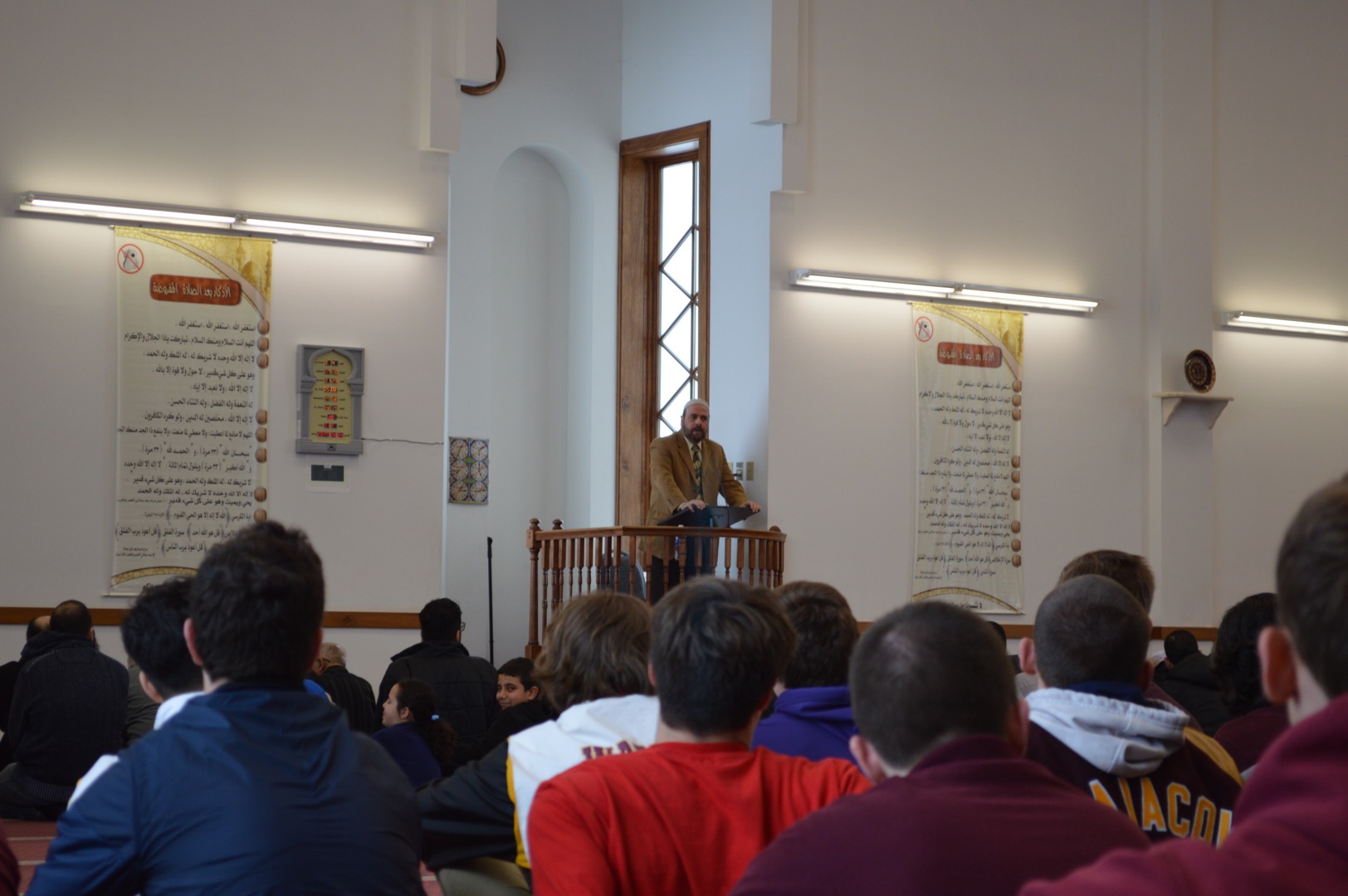
WJ seniors listen on to Imam Nader Taha of the Islamic Center to learn about humanity’s purpose in the world and remaining committed to doing justice.
The results have been devastating: more than 500,000 people have died in the last six years in Syria, millions of refugees from Syria and Iraq try to flee daily, and Palestinians are persecuted 70 years after being displaced from their land. In frustration, young and misguided people have tried to legitimize their own ideas of government, which has tragically led to acts of terrorism. What these terrorists do, however, has nothing to do with Islam. Their crimes are perpetuated by arguing that Islam allows them to do so. MAKE NO MISTAKE: TRUE ISLAM HAS NOTHING TO DO WITH TERRORISM. That is why, before the past two decades, Islamic terrorism was never even a concept. How could it be that for 1400 years, a religion that has been practiced peacefully all of a sudden supports violence?
The Holy Quran states, “Whoever kills an innocent person unjustly, it is as if he has killed all of humanity.” Simply put, Islam is a religion of mercy. What is seen in the media is by no means a true representation of the faith.
I am asking you for just one thing. I am asking you to believe. Not in my ability to stand up for the injustices that are going on in the Muslim world, but in yours. As the majority of the people in attendance here are Catholics, the idea of ecumenism and interreligious dialogue is at the heart of your faith, as it is of Islam. Educate others. Create unifying programs, such as volunteer opportunities between the two faiths or educational workshops. Pray for peace in both communities, not just in the one to which you belong. Love one another. Show mercy for our brothers and sisters in Syria, in America and around the world. For, indeed, Jesus taught us this. And so did the Prophet Muhammed.
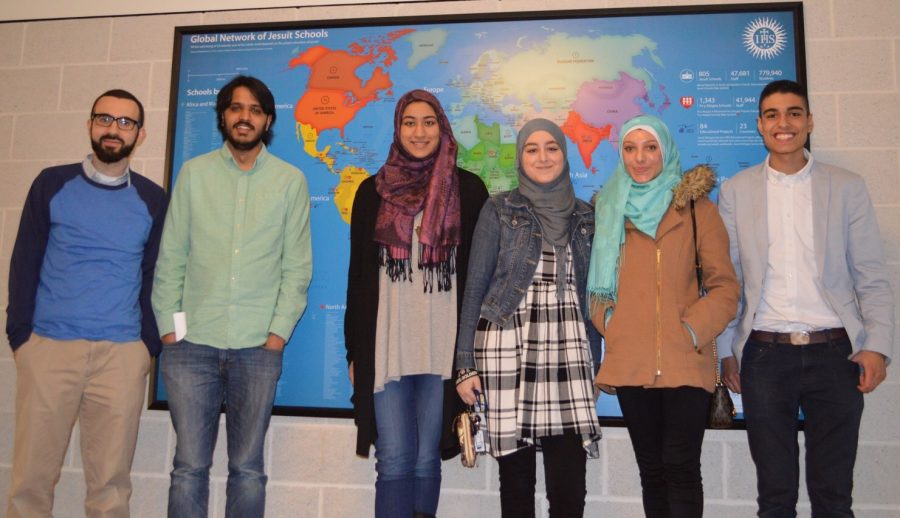
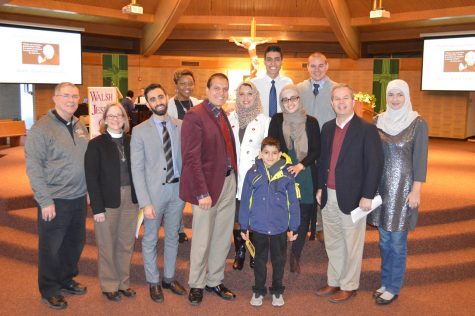
Youssef Osman • Apr 10, 2017 at 9:47 pm
What an honor it is to have been a Walsh Warrior these past four years. I have learned more about the world, its people, and myself by simply being a part of the school community. I will forever be indebted to the place that has made me the man that I am today. What a blessing attending Walsh Jesuit has been for me!